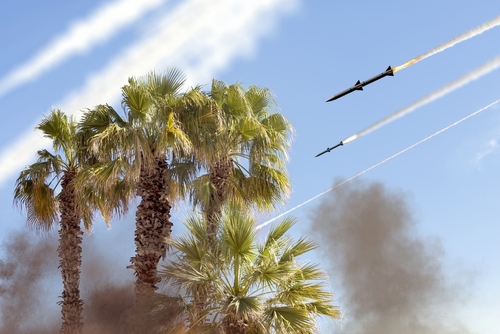
In a stark reminder of the ongoing volatility in the Middle East, a rocket attack on an Iraqi base housing U.S. troops has resulted in several injuries. This incident underscores the persistent threats faced by American military personnel stationed abroad, particularly in regions plagued by instability and conflict.
The attack occurred at the Ain al-Asad airbase, a strategic location in Iraq's Anbar province. This base has been a critical site for U.S. and coalition forces, serving as a hub for operations against terrorist groups in the region. The assault involved multiple rockets, causing injuries to both Iraqi and U.S. personnel. The exact number of casualties and the extent of their injuries remain unclear at this time.
🚨 SIX HOURS have past now since several U.S. troops were injured by a rocket attack on a U.S. base in Iraq, and we’ve still gotten NOTHING from the White House
What the hell is going on?
Where are Biden and Harris??! pic.twitter.com/bGhNqcVi0w
— Nick Sortor (@nicksortor) August 6, 2024
This latest attack highlights the ongoing dangers posed by militant groups operating within Iraq. Despite efforts to stabilize the country and combat extremist factions, these groups continue to launch assaults on military installations and personnel. The Ain al-Asad base has been targeted multiple times in the past, reflecting the persistent threat environment.
The U.S. military presence in Iraq has been a contentious issue, both domestically and internationally. Advocates argue that American forces are essential for maintaining regional stability and supporting Iraqi security forces in their fight against terrorism. Critics, however, contend that the continued presence of U.S. troops exacerbates tensions and invites attacks from hostile entities.
🔴 BREAKING NEWS: Rocket sirens sound across northern Israel as Hezbollah terrorists attack Israeli communities with explosive drones.
According to initial reports, two people were injured, one of them in serious condition.
We will not let the people of Israel be terrorized. pic.twitter.com/Z57A4Da53m
— Israel ישראל (@Israel) August 6, 2024
In response to the attack, U.S. officials have reiterated their commitment to protecting American personnel and supporting their Iraqi counterparts. The Pentagon is currently assessing the situation and considering potential responses to ensure the safety of its forces. This may include increased security measures at military bases and enhanced intelligence operations to identify and neutralize threats before they materialize.
The broader geopolitical implications of this attack cannot be ignored. It comes at a time when the U.S. is reevaluating its military commitments in the Middle East, balancing the need to counteract terrorism with the desire to reduce its footprint in the region. The Biden administration has faced pressure to withdraw troops from Iraq and Afghanistan, yet incidents like this underscore the complexities of such decisions.
Moreover, this attack could impact U.S.-Iraq relations. The Iraqi government has repeatedly expressed its desire for a reduced foreign military presence, while also acknowledging the critical support provided by U.S. forces. Navigating this delicate balance will require careful diplomacy and a clear strategy to address both security concerns and sovereignty issues.
In the wake of the attack, there will likely be calls for a reassessment of U.S. military strategy in Iraq. Lawmakers and military leaders must weigh the risks and benefits of continued engagement in the region. Ensuring the safety of American troops while supporting global counterterrorism efforts remains a top priority.











